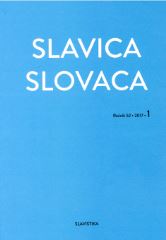О чувстве вины в русском языковом сознании
A Sense of Guilt in the Russian Language Conscience
Author(s): Andrey Evgenyevich BochkarevSubject(s): Sociolinguistics, Cognitive linguistics, Descriptive linguistics, Social Norms / Social Control
Published by: SAV - Slovenská akadémia vied - Slovenský komitét slavistov a Slavistický ústav Jána Stanislava SAV, v.v.i.
Keywords: Corpus linguistics; emotional concept; social norms; mental attitude;
Summary/Abstract: This publication explores the ways of displaying guilt in the Russian language conscience. According to the National Corpus of the Russian language guilt is defined in different contexts as cause and bad act as well as feeling. As a cause of something wrong it is related to coincidence, national mentality, curiosity, love and fate; as a bad act it is related to fault, adultery, alcoholism and crime; as a feeling of responsibility for such wrongs, whether real or imagined, it is related to pang of remorse, conscience, shame and fear. And we can estimate the degree of guilt, as such, only in regard to any social norm as moral or penal law. In this way, the analyzed emotional concept is constant and variable at the same time: constant as an object of understanding, variable as a contextual meaning.
Journal: Slavica Slovaca
- Issue Year: 52/2017
- Issue No: 01
- Page Range: 16-26
- Page Count: 11
- Language: Russian

